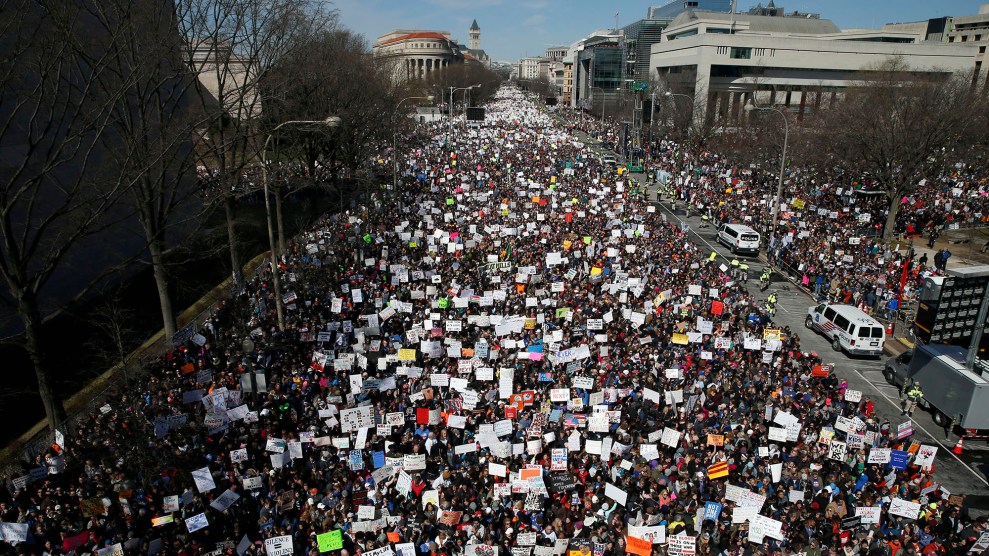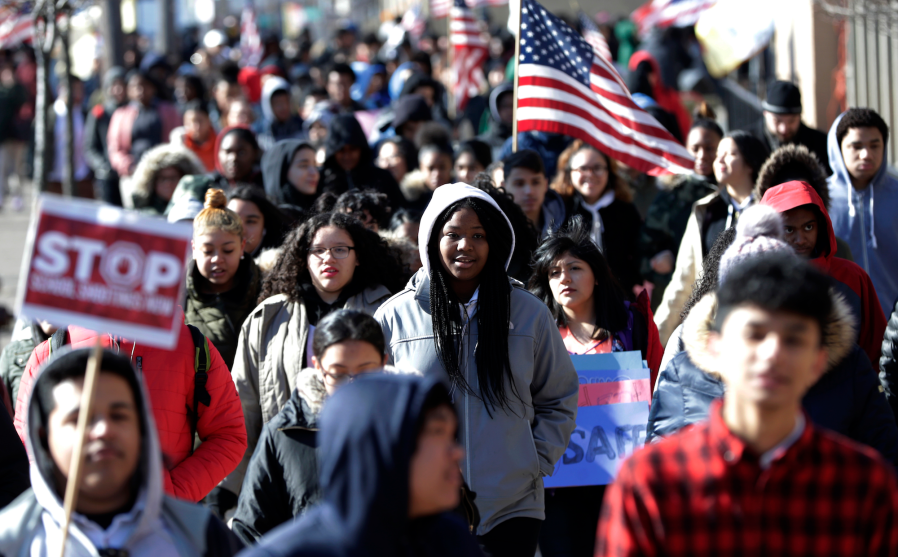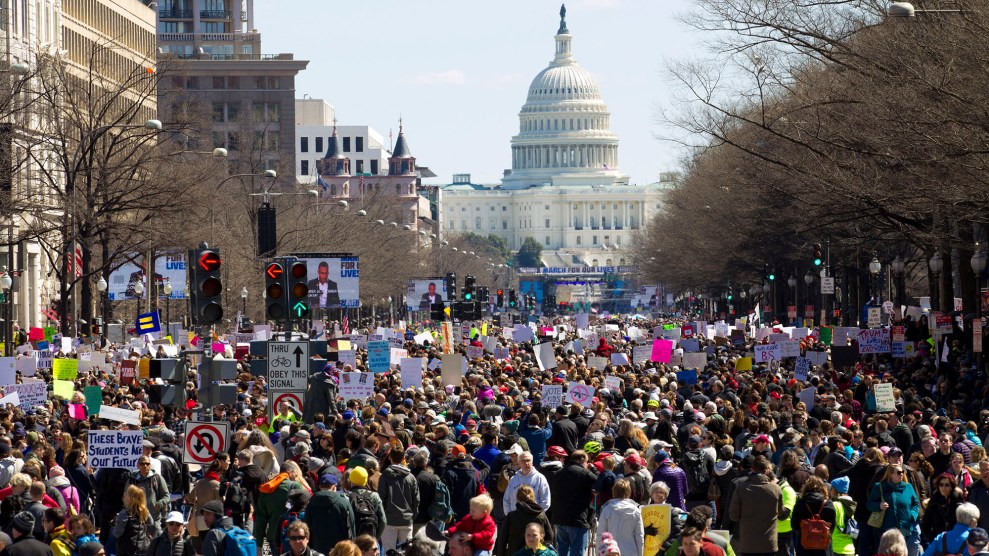
Huge numbers of high school students demonstrated at last month's March for Our Lives. Imagine if they could vote.Jose Luis Magana/AP
At last month’s March for Our Lives in Washington, DC, the 20 young people who spoke had a clear message for the hundreds of thousands of protesters: Vote. Specifically, they urged their supporters to vote out of office any lawmaker who stands in the way of gun control. “The voting is what we’re pushing here,” Stoneman Douglas student and #NeverAgain activist Jaclyn Corin said in an interview with Crooked Media before the march. “The March is kind of a statement saying, ‘Hey, we’re gonna be voting in November. Watch out—all these people are voting against you.’”
Of course, in a country where the voting age is 18, most of these high school activists can’t actually practice what they preach. But the nationwide demonstrations added fuel to a conversation sparked last month when Stoneman Douglas students took their lawmakers to task on CNN—a growing number of commentators are now calling for the voting age to be lowered to 16.
It’s not a wholly new idea; activists have been fighting for this change for years. In a few cities, they’ve succeeded—at least when it comes to local elections. Even some prominent lawmakers, such as House Minority Leader Nancy Pelosi (D-Calif.), have supported it. To advocates, lowering the voting age is not simply a matter of rewarding the political enthusiasm shown by students. Research suggests that voting in high school might actually help lead to greater lifelong civic engagement. Scholars, moreover, argue that the teen brain is prepared to make complex political judgements. And while the movement faces strong detractors and procedural hurdles, proponents hope it could find new resonance after Parkland.
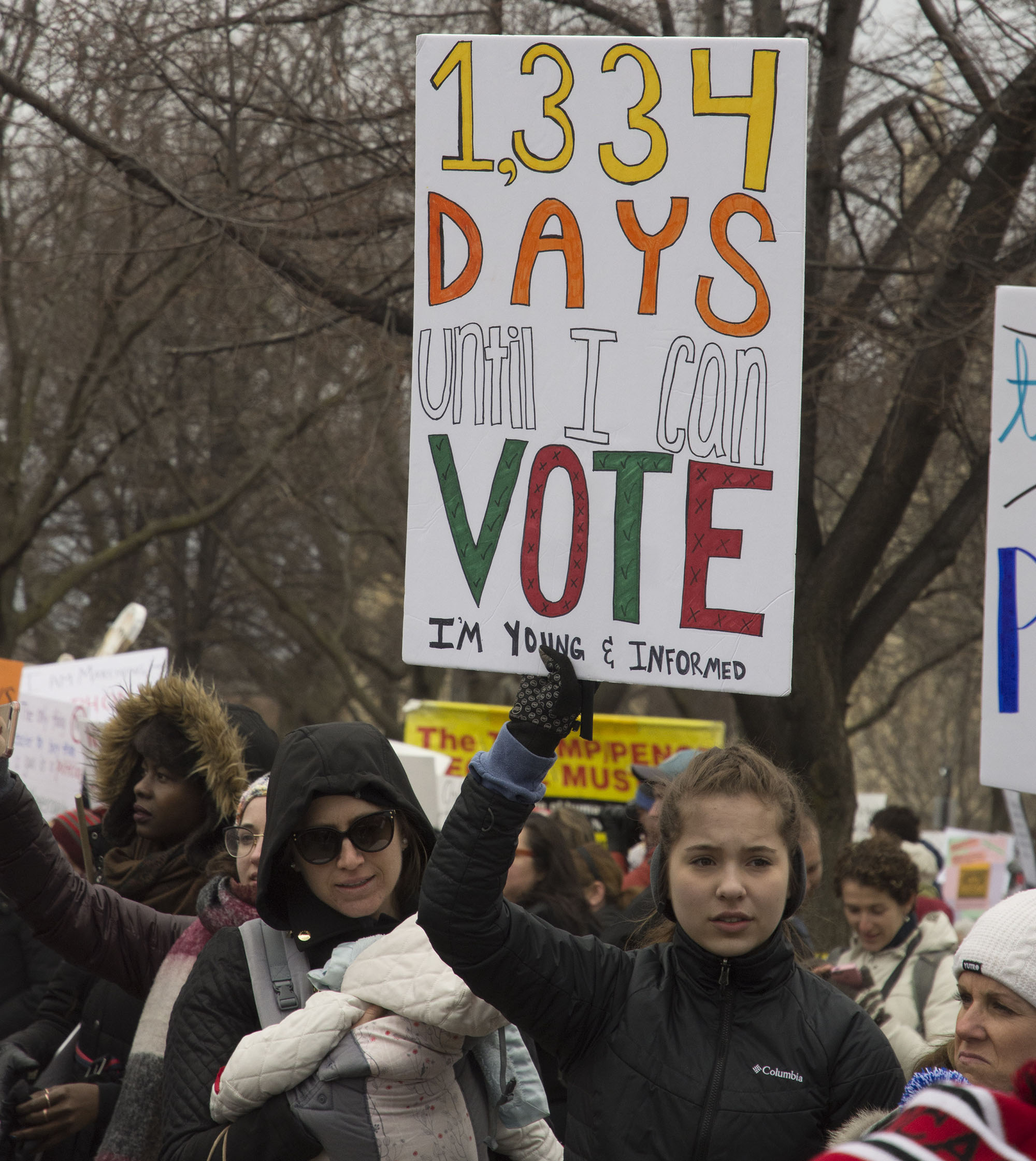
A young protester at the March for Our Lives rally in Chicago counts down the days until she can vote.
Karen I. Hirsch / ZUMA
America’s original voting age, 21, was set in a somewhat arbitrary fashion, according to Joshua Douglas, a law professor at the University of Kentucky. That had been the age under British common law, and the Founders simply followed their colonizer’s lead. The age didn’t change until the Vietnam War era, when young people reasoned that those who were old enough to be drafted into the military should have a say in choosing the lawmakers and political leaders who sent them to war. In 1971, their push led to the 26th Amendment, which guaranteed anyone 18 years old or older the right to vote.
Twenty countries have granted 16- and 17-year-olds the right to vote. A handful of American cities have done the same for local elections. They can do this because states generally regulate their own voting laws, as do cities that are governed by their own charters. The 26th Amendment states only that 18 is the minimum age at which voting rights must be protected; it doesn’t prohibit cities and states from making it even lower. In 2013, Takoma Park, Maryland, became the first US city to lower the voting age for local elections to 16, and early data points suggest that the experiment has been successful. In an off-year local election that would normally yield a low voter turnout, 17 percent of the city’s voting-eligible 16- and 17-year-olds cast ballots. That might sound low, but it was was double the 8.5-percent turnout of those 18 and up. Since then, nearby Hyattsville, Maryland, has followed suit. People 16 and up can now vote in local school board elections in Berkeley, California, as well.
The promising rates of participation echo research conducted into voter pre-registration initiatives, which enable 16- and 17-year-olds in some states to register to vote in anticipation of becoming 18 before an election. A 2017 study found that turnout among young voters is as much as 13-percent higher in states with pre-registration systems, and that the bump applied fairly uniformly to voters representing all demographics and political ideologies.
The correlation, says Michael McDonald, a political science professor at the University of Florida who has done research on pre-registration initiatives, may have something to do with the fact that these programs typically occur within schools. Teenagers generally attend high school, after all, and for those who don’t go off to college, it might be the last time they can easily connect with local civic engagement opportunities—especially in light of declining membership in institutions such as churches and unions. “You were capturing some of the young people who didn’t go off to [college] and who stayed in their communities, they were continuing to be politically engaged,” McDonald says of the pre-registration efforts he studied in Florida and Hawaii, the first states to enact such initiatives. High school also offers a last shot at robust civic education, which McDonald and others say is key to lifelong voting.
Peter Levine, the former director of the Center for Information and Research on Civic Learning and Engagement, a research organization that focuses on youth democratic participation, also points to the fact that high school may be one of the best times to establish civic habits like voting—before the disorienting transition into early adulthood begins. “People are still in their context where they grew up, so they can make a transition to voting more easily,” he says. “Eighteen is arguably a really bad year to start because that’s when everybody’s lives are [being] disrupted.” That’s important, since one of the best predictors of whether someone will vote in an election is whether they did in the last one. In short: If someone doesn’t vote in their first election, it’s less likely they’ll build the lifelong routine.
Arguments for good habits aside, are teens really mature enough to responsibly wield voting powers? Yes, says James Youniss, a retired professor of psychology at Catholic University and co-author of a new book about youth civic engagement. He points to assessments showing that 16- and 17-year-olds know as much as 18-to-25-year-olds about government, and that the two age groups pay attention to news with similar frequency. As for those who worry about teens’ cognitive abilities, the two age groups also score similarly on tests of social studies and reading comprehension, and voting draws on the areas of the brain that are sufficiently mature to allow 16- and 17-year-olds to make civic decisions with the same sophistication as young adults. The issue, says Youniss, is the way society views teens, who have played key roles in political action and community development throughout America’s history. “What’s happening in society is the steps toward adulthood are being stretched out and delayed,” he says. “Young people look like they aren’t doing much, but when they are involved in something, they’re being very constructive.”
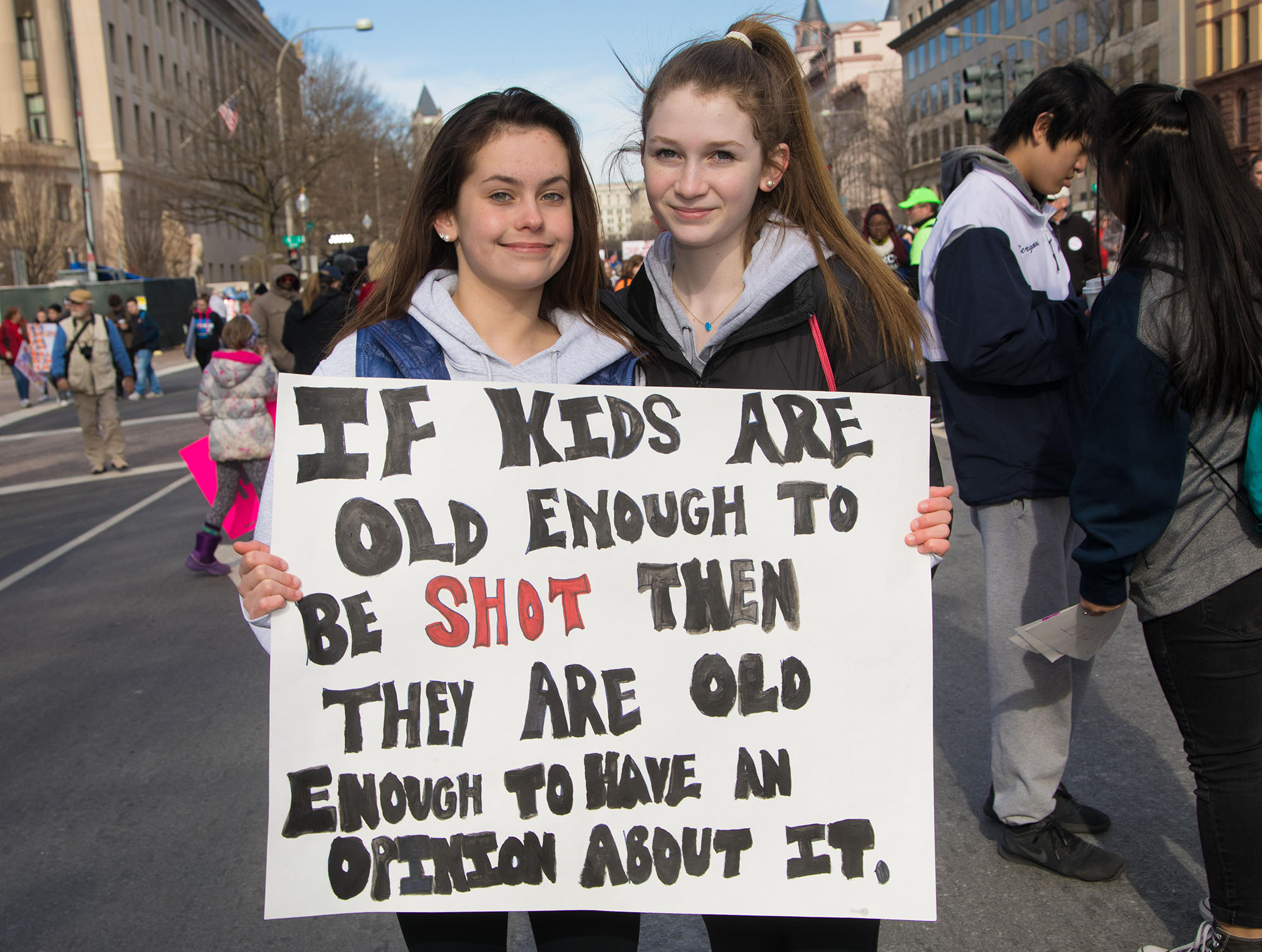
Two protesters at the March for Our Lives rally in Washington, DC.
Jeff Malet / Newscom via ZUMA
So what if the city of Parkland wanted to reward its woke teens with the right to vote in local elections? Since Parkland is a charter city, that would be simple enough, says Brandon Klugman, a campaign representative with Vote16USA, which supports grassroots efforts to lower the voting age. As in Takoma Park, Parkland’s city commission would likely just need to pass a charter amendment to make the change. Otherwise, activists would need to press for a change at the state level, an effort already underway in California and New York, where lawmakers have introduced state constitutional amendments to lower the voting age to 17.
But while such changes are simple enough for local or statewide elections, lowering the voting age for US House, Senate, and presidential elections could prove far more complicated. In theory, states can make their own election rules, but they also have to contend with national laws that regulate federal election procedures. For example, the Help America Vote Act, a 2002 law intended to address problems that arose during the 2000 election, included a provision that limits the use of mail-in registration forms to individuals over 18. Should California want to enfranchise 16-year-olds for the presidential election, for example, those teens might have to register in person. This could raise questions about fairness, especially since the California Supreme Court has emphasized that democracy “requires that every effort be made to apply uniform standards and procedures to all qualified voters equally.” If California courts held to that principle, writes law student Meghan Fenzel on SCOCABlog, a joint project of Berkeley Law and the Hastings Law Journal, “the limits imposed by HAVA could effectively prevent California from lowering the voting age for federal elections.”
The registration issue isn’t necessarily insurmountable, says Drew Penrose, the legal and policy director at Fair Vote, a nonpartisan electoral reform group. He notes that California could petition the federal government to modify the form. But those procedures stem from Congress’ powers to regulate federal elections and, as Fenzel writes, Congress could attempt to block state efforts to lower the voting age. That’s especially true if the federal government remains under GOP control, since a number of conservatives have already expressed vocal opposition to the idea. Columnist David Davenport rejected the proposal in 2016 Forbes op-ed, calling support from liberal lawmakers a partisan play, “since young people are frequently liberal until they start paying taxes and really have to deal with the government, which does not happen at 16.” Brandon Morse, a writer for the conservative blog RedState, echoed those sentiments in the wake of the Parkland shooting, asserting that a writer who backed teen enfranchisement did so because he was “lamenting the fact that people who would vote like he would vote, can’t vote.”
Conservatives likely aren’t wrong about the political implications of younger people voting. While there’s obviously no data on the 16- and 17-year-olds’ voting patterns, millennial voters certainly lean further left than older generations and tended to support liberal candidates in the 2016 election.
Any worries about legal complexities might be premature at this stage—state bills that would grant 17-year-olds voting rights in federal elections have languished since their introduction. And for the time being, Vote16USA’s ongoing advocacy efforts in Massachusetts, Virginia, Colorado, and cities across California have focused on allowing teens to vote in school board races and other municipal contests, and on building a broad base of support before tackling bigger projects.
Still, advocates say the Parkland students’ activism, and the op-eds they’ve inspired, have helped the movement gain traction. “People we’ve met have said, ‘I never would have realized that young people could engage like that,’” says Pooja Patel, a high school junior from Chicago and member of Vote16USA’s Illinois chapter. “The push for gun control has opened up the doors to more people being receptive to this.”
According to Julieta Hernandez, a high school senior from Sacramento, California, who has been working to lower the voting age for local school board elections, more of her peers are getting interested. “They don’t want to just protest and advocate; they want to vote,” she says. “They see it as another step to accomplish what they want to see in the government.”
And in some communities, lowering the voting age isn’t just about giving teens a voice. For the US citizen children of undocumented immigrants, it might be the only way for an entire family to have a say. José Medel, a high school senior from Sacramento who works with Hernandez on the school board campaign, says that’s a reality facing many of his Latino peers. “In the brown community, many of our parents are undocumented, and many of our families can’t participate in voting,” Medel says. “It’ll help us hold our school board members accountable when our family members can’t. “

